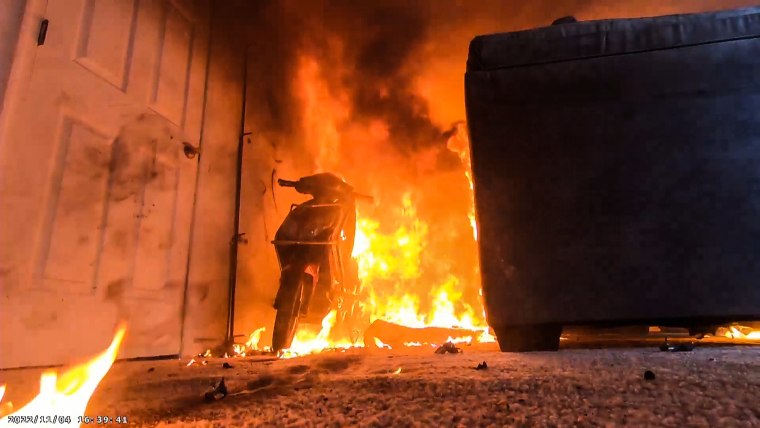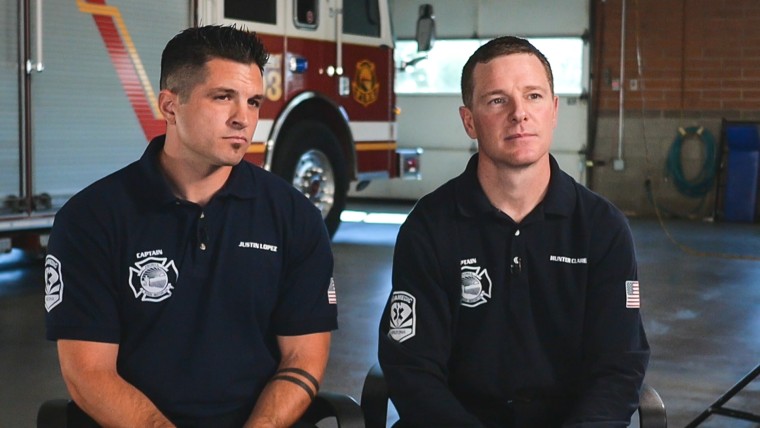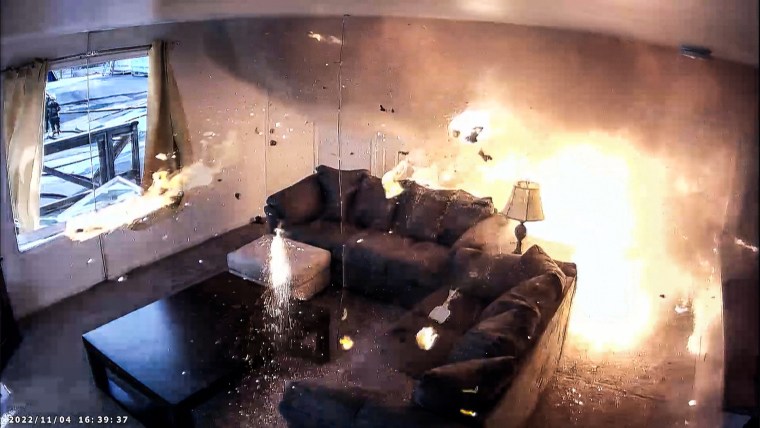 [ad_1]
[ad_1]
Final July, an electrical transit bus in Connecticut burst into flames whereas parked at a depot. A month later, an electrical scooter sparked a fireplace inside a New York Metropolis condo that killed a 5-year-old woman and 36-year-old lady. And final month, a fireplace believed to be attributable to the batteries in an electrical scooter engulfed a multifamily dwelling in Brockton, Massachusetts.
Lithium-ion batteries have change into a ubiquitous characteristic in new types of transportation and customary family merchandise. They're additionally present in residential photo voltaic vitality techniques.
However when these batteries fail or overheat, they launch flammable, poisonous gasses that may spark a fast-spreading hearth that's extraordinarily troublesome to extinguish.
“The supply of the gasses which are creating the flames is confined inside a cell battery that won't permit water in,” stated Ofodike Ezekoye, a fireplace scientist and professor of mechanical engineering on the College of Texas at Austin. “When firefighters are responding to most of these incidents, it takes lots longer to have the ability to management the fireplace as a result of it requires a lot extra water.”
With the variety of fires attributable to lithium batteries hovering throughout the U.S., firefighters and different specialists say the coaching wanted to battle them successfully is lagging in lots of locations. Firefighters and metropolis officers are additionally imploring the producers to revamp the batteries in order that, once they fail, the ensuing fires might be put down extra simply.
“What we’re seeing is these new applied sciences, as essential as they're, they make it out into the sphere earlier than we all know all of the doable penalties that would come from them,” stated Steve Kerber, the chief director of the nonprofit UL Hearth Security Analysis Institute. “It isn’t till failures begin to occur that the fireplace service understands what the implications are. That’s the place we have to begin taking part in catch-up.”

Kerber stated his staff has run assessments on lithium-ion batteries during which it took solely 15 seconds from the primary signal of smoke to the home windows being blown out in a home. In a conventional hearth, it sometimes takes about three minutes for a room to be engulfed, he stated.
“With such explosion hazards, it’s extremely essential that we get firefighters to know find out how to function safely,” Kerber stated.
Hunter Clare and Justin Lopez, who work for the fireplace division in Peoria, Arizona, have firsthand expertise of the hazards.
In April 2019, the 2 hearth captains responded to a name at a facility that was housing 1000's of lithium-ion batteries used to retailer vitality for an influence grid. The batteries are crucial parts in such amenities that retailer photo voltaic vitality.
Clare and Lopez arrived together with different first responders to discover a white cloud of vapor seeping out of the constructing and drifting throughout the desert.
“It was staying about 3 to 4 toes off the bottom, and it was form of swaying like sea water,” Clare stated.

The firefighters suspected that it was some form of chemical cocktail. They secured the realm and used particular gadgets to check the air, which confirmed harmful ranges of hydrogen cyanide and carbon monoxide.
Then they waited till the vapors stopped flowing out of the constructing and the degrees of flammable fuel dropped. Practically two hours handed earlier than the firefighters made their method to the entrance door of the ability. After they opened it, a big cloud escaped the constructing. Earlier than they might retreat to security, the house ignited, setting off a strong explosion.
Lopez landed 30 toes away, in line with a report by the Hearth Security Analysis Institute. Clare was thrown about 70 toes, his physique in flames.
“Don’t keep in mind the explosion. Don’t keep in mind something from there,” Clare stated.
Each males suffered extreme accidents, together with mind trauma.
Lopez had a collapsed lung, damaged ribs, a damaged leg, separated shoulder, laceration of the liver and a number of thermal and chemical burns, in line with the report.
Clare suffered a watch damage, backbone injury, damaged ribs, damaged ankles, a damaged scapula, inner bleeding and thermal and chemical burns.
However they know they’re fortunate to be alive.
“It may have been worse,” Lopez stated.
“If you happen to received there, and also you had been in the course of nowhere and didn’t have the coaching that you simply wanted, you would possibly rush in,” Clare stated.
The rise of electrical scooters in cities has led to an enormous spike in battery fires.
Lithium-ion batteries sparked greater than 200 fires in New York Metropolis final 12 months alone, killing six individuals and injuring almost 150. That’s double the quantity of battery fires in 2021, in line with the New York Metropolis Hearth Division.
Up to now this 12 months, electrical bike batteries have been recognized as the reason for three fires in New York.
The most up-to-date blaze broke out inside a constructing within the Inwood part of Manhattan on Feb. 5. Three individuals had been hospitalized in crucial situation, officers stated. Final week, an e-bike battery sparked a fireplace at a daycare heart in Queens that injured almost 20 youngsters.
Keith Badler, senior technical coach with the Port Authority of New York and New Jersey, stated he’s notably involved about the specter of a battery hearth in a bridge or a tunnel. He famous that it usually takes an enormous quantity of water to extinguish the chemical-fueled blazes.
“We don’t have the luxurious of simply letting it burn out within the open, or in a tunnel and even in a bridge,” Badler stated.

An business commerce group, PRBA — the Transportable Rechargeable Battery Affiliation — stated it's “collaborating with emergency response governmental companies and business organizations to extend consciousness in regards to the dangers posed by lithium ion batteries throughout dealing with, storage, and in transportation.”
“We welcome the chance to work with all events on lithium ion battery outreach and schooling to forestall lithium ion battery incidents, enhance client security, and develop a constant message on the proper lithium ion battery emergency response and security procedures,” the group added.
Some hearth departments in Arizona and elsewhere have added a brand new instrument to battle these sorts of fires: a chemical additive specifically designed to soak up warmth and put down sure sorts of blazes.
The product, often called F-500 Encapsulator Agent, has proven in early assessments to be efficient at placing out the cussed fires created by lithium-ion batteries.
“We’re absorbing the warmth versus attempting to dissipate the warmth by steam,” stated Ron Lowrey, a former hearth chief in Pennsylvania who now works for one firm that produces the product, Hazard Management Applied sciences. “It’s a a lot better medium for cooling.”
[ad_2]
Supply hyperlink https://classifiedsmarketing.com/?p=37095&feed_id=134407


